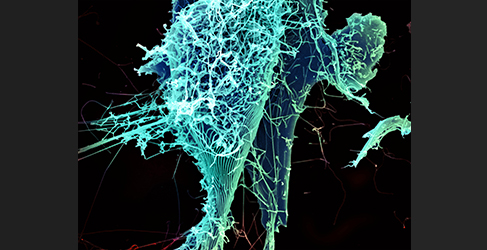Cybernetics and Society - 18 October 2016 - Cybernetics, Unknowability and Politics
Duration: 36 mins 51 secs
Share this media item:
Embed this media item:
Embed this media item:
About this item

| Description: |
Professor Andrew Pickering (Emeritus Professor in Sociology, Philosophy and Anthropology, University of Exeter)
Discussant: Professor Simon Schaffer (Professor of History of Science, University of Cambridge) What if the unknowable was not simply a blank to be filled or a defect to be rectified, but instead, an inescapable facet of everyday existence, which continually regenerates itself as we attempt to know and interact with the world? In these papers, Professor Andrew Pickering demonstrates how cybernetics — the mid-century science of feedback and control — embraced the unknowable by substituting older ideas of scientific certainty with a new cybernetic ontology, which embraced processes of adaptation and becoming. Professor Pickering’s papers will explore the activities of Stafford Beer (1926-2002), the theorist of management cybernetics whose work extended from simulations of automatic factories to economic planning to team-based management solutions development. Beer’s efforts revolved around the construction of management systems that would performatively adapt to environments that they could not fully control. In keeping with the mercurial nature of cybernetic thought, such systems are highly suggestive in a political sense, encouraging us to think beyond the limiting conventions of electoral representation to imagine alternative frameworks for decision-making — ones that allow for a more successful realisation of our democratic aspirations. |
|---|
| Created: | 2016-11-02 10:56 |
|---|---|
| Collection: | Cybernetics and Society |
| Publisher: | University of Cambridge |
| Copyright: | Glenn Jobson |
| Language: | eng (English) |
| Keywords: | Andrew Pickering; Simon Schaffer; |
| Abstract: | Professor Andrew Pickering (Emeritus Professor in Sociology, Philosophy and Anthropology, University of Exeter)
Discussant: Professor Simon Schaffer (Professor of History of Science, University of Cambridge) What if the unknowable was not simply a blank to be filled or a defect to be rectified, but instead, an inescapable facet of everyday existence, which continually regenerates itself as we attempt to know and interact with the world? In these papers, Professor Andrew Pickering demonstrates how cybernetics — the mid-century science of feedback and control — embraced the unknowable by substituting older ideas of scientific certainty with a new cybernetic ontology, which embraced processes of adaptation and becoming. Professor Pickering’s papers will explore the activities of Stafford Beer (1926-2002), the theorist of management cybernetics whose work extended from simulations of automatic factories to economic planning to team-based management solutions development. Beer’s efforts revolved around the construction of management systems that would performatively adapt to environments that they could not fully control. In keeping with the mercurial nature of cybernetic thought, such systems are highly suggestive in a political sense, encouraging us to think beyond the limiting conventions of electoral representation to imagine alternative frameworks for decision-making — ones that allow for a more successful realisation of our democratic aspirations. |
|---|---|

